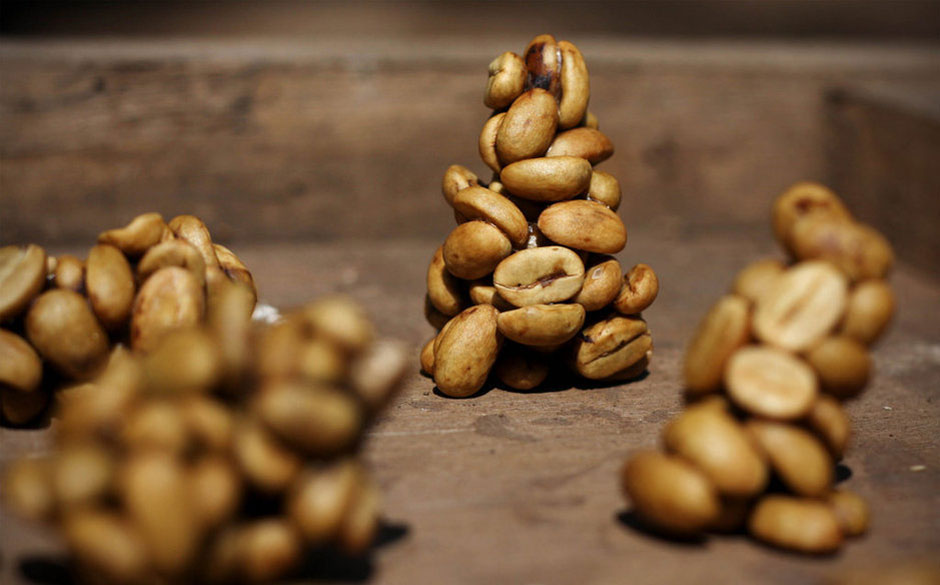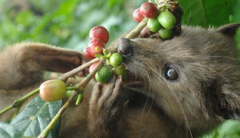Kopi Luwak Coffee Brand method introduction production method production skills brewing method
1 Coffee brand
The kopi luwak Coffee brand guarantees 100% wild kopi luwak, which is produced in Sumatra, Zawa, and Sulvish and is part of the 13677 islands of Indonesia. Kopi Luwak brand is the only officially recognized brand by the Indonesian government, and it is deeply loved by coffee lovers for its unique fruity aroma and long aftertaste.
Kopi Luwak is definitely an international luxury because it is produced by civets (Luwak) rather than humans, especially the wild civets born and raised in Indonesia, which are vegetarian and very rare and precious. Indonesian coffee has a long historical background, and coffee footprints can be found in almost every corner of the country. Mountainous islands are very suitable for its growth, and wild coffee can often be found all over the woods. this provides convenience for the producer of Kopi Luwak, the civet.
2 introduction of methods
Manufacturing method

The civet steals food and the roasting process of Luwak coffee beans:
1. Civets like to eat red coffee fruits that are ripe on coffee trees.
2. Pick out undigested coffee seeds from cat droppings
3. Remove the silver gray film of coffee seeds, wash them with water and dry them in the sun.
4. Luwak coffee beans are made by stir-frying.
Production skills
1. After Indonesians remove the silver-gray film on the appearance of coffee beans, wash them with water, dry them in the sun, and then stir-fry them, they become cat shit coffee beans.
2. Only about 150 grams of coffee beans can be extracted from a jin of civets' feces, which will cause 20% loss in the roasting process. Due to the unique raw materials and production process, this kind of coffee can be said to be very rare. No more than 400 kilograms of coffee beans are supplied worldwide every year.
3. Traditionally, coffee fruit is washed or sun-treated to remove excess parts and take out coffee beans, but Luwak obtains coffee beans by using its natural fermentation in civets, so it has a unique flavor.
3. Edit in brewing mode
The aroma of brewed coffee Kopi Luwak is easier to lose than that of ordinary coffee. In order to maintain the flavor, coffee beans should be packaged independently and then injected with nitrogen to prevent the oxidation of coffee beans. The production process is complicated and rigorous. If you want to enjoy the true taste of Kopi Luwak, do not add sugar or milk to your coffee. It is recommended to use an air stopper (Siphon siphon), add 160g / 180ml (ml) of pure water, pour 17g (grams) of coffee powder with about 2 flat spoons of coffee, and gently press down the raised coffee powder with flat bamboo slices after the water boils up. Remember! Do not stir, otherwise the coffee will become bitter, sour and astringent.
The water temperature is 96 ℃, the water pressure is 9-10atm, boil for about 1 minute 45 seconds ~ 2 minutes, quickly remove the fire source and wipe the glass bottle with a cold wet cloth to make it cool rapidly, the brewed coffee will quickly fall and show a large number of golden fine foam, so that the ultimate flavor can be achieved. In the general way of brewing, some people say that civet coffee can be brewed for 2 or 3 times, but the above brewing method is regarded as the essence after boiling for a long time, so rebrewing is not recommended.
4 related comments
Kopi Luwak is said to have tasted the coffee, but the taste of the experts have gone to two extremes, one described the coffee as "the best in the world", the taste is so unusual that it is difficult to describe in words: "with a bit of dirt, slightly choking and visceral taste, stay in the mouth for a long time until the last drop." Another evaluation is quite the opposite: "it's hard to swallow, it's a complete gimmick, and it's not worth paying for stinky coffee."
Coffee experts say that most Luwak coffee comes from low-altitude robusta beans, suggesting that civets prefer robusta beans to Arabica beans at higher altitudes. As the activity range of Luwak belongs to low and middle altitude, most of the coffee varieties are robusta beans, while Arabica beans at high altitude are rarer. Indonesian coffee itself has the taste of earth and traditional Chinese medicine, and its consistency is among the highest in all continents, but Luwak coffee has a better taste and consistency, especially with a consistency almost close to syrup, and its flavor is very special (if it can be described by fragrance).
The coffee made from the real civet coffee will emit a fragrance like honey and chocolate, and it will have a sweet, smooth and rich taste without adding sugar and cream, while the texture of the original water has been fully covered by the round and rich texture of the coffee, so the tip of the tongue can hardly feel the quality of the water at the beginning of the mouth. Not bitter, not sour, not astringent, but a little more milk flavor, and after entering the throat without scraping the stomach will not cause stomach discomfort. Even if it is cold, the taste is still mellow. After tasting it, the cup still has a sweet smell of milk. It is a coffee with rich texture and depth, and it is absolutely unique. But if you don't like the taste of Indonesian coffee in the first place, then to be sure, you will hate Luwak coffee more; but if, on the contrary, you like the fishy smell of aged Indonesian beans or Indian-style beans, you may fall in love with Luwak coffee with similar flavor.
Once at a tasting, many celebrities savoured every fragrance of Luwak coffee without being told the truth, and tried to describe their sensory reactions with gorgeous words. However, when people know the origin of this drink, they feel stomach discomfort at the same time. Civet Coffee salespeople suggest that if you want to use this coffee to entertain a guest, either never tell him the truth, or tell him the origin of the coffee in advance and let him decide whether to drink it or not, lest he overreact.
5 professional terms
Kopi Luwak flavor [Flavor]: overall impression of aroma, acidity, and mellowness.
Acidity [Acidity]: the strong acidity of all coffee grown on the plateau. The sour here is different from bitterness and Sour, and has nothing to do with pH value. It refers to a fresh and lively quality that promotes coffee to exert its functions of invigorating the mind and clearing the taste. The acidity of coffee is not the acidity or sour smell of acidity or alkalinity, nor is it an uncomfortable acid that enters the stomach. When making coffee, the performance of acidity is very important. under good conditions and skills, a special taste with fresh acidity can be developed, which is a necessary condition for high-grade coffee. The sour taste of coffee describes a lively, bright flavor, which is somewhat similar to that used in wine tasting. If the coffee bean lacks acidity, it is equal to lose vitality, taste empty and boring, without layer depth. Acidity has many different characteristics, such as coffee beans from Yemen and Kenya, which have an impressive fruity aroma and a red wine-like texture.
Mellow [Body]: the taste of the tongue after drinking coffee. The change of mellowness can be divided into light to light, medium, high, fat, and even Indonesian coffee is as thick as syrup.
Odor [Aroma]: the smell and aroma emitted after the coffee has been prepared. The words used to describe smell include caramel, carbon roast, chocolate, fruit, grass, malt, and so on.
Bitterness [Bitter]: bitterness is a basic sense of taste, and the sensory area is distributed in the base of the tongue. The bitterness of deep baking is deliberately created, but the common cause of bitterness is too much coffee powder and too little water.
Light [Bland]: coffee grown in lowlands, usually quite light and tasteless. Coffee with insufficient coffee powder and too much water will have the same light effect.
Salty [Briny]: after brewing, if the coffee is overheated, it will produce a salty taste.
Aroma of Kopi Luwak soil [Earthy]: commonly used to describe spicy, earthy Indonesian coffee, not the smell of beans stained with soil. Uniqueness [Exotic]: describes coffee with its unique aroma and special flavor, such as flowers, fruits, and spices. Coffee from East Africa and Indonesia usually has this property.
Aromatic alcohol [Mellow]: used to describe coffee with good acidity balance.
Mild [Mild]: used to describe a coffee with a harmonious, delicate flavor, used to refer to all plateau coffee except Brazil.
Soft [Soft]: describes low acidity coffee such as Indonesian coffee, and also describes it as mellow or sweet.
Sour [Sour]: a sense of taste in which the sensory area is mainly located at the back of the tongue and is characteristic of light roasted coffee.
Spice [Spicy]: a flavor or smell reminiscent of a particular spice.
Strong [Strong]: technically, it describes the advantages and disadvantages of various tastes, or the relative ratio of coffee to water in a particular conditioned product. In terms of popular usage, it describes the strong flavor of deep-roasted coffee.
Sweet [Sweet]: in essence, it is like fruit, and it also has something to do with the taste of wine.
Wild [Wild]: describes coffee with extreme taste characteristics.
Wine [Winy]: fruit-like acidity and smooth mellow, created by the contrast of special flavor.
6 feeding process
There are many ways for civets to feed Kopi Luwak, one is to pick up coffee beans discharged by civets after eating coffee beans in a natural coffee garden, and a kind of artificially fed coffee beans. In the production process of Kopi Luwak in Yunnan, China, some farmers adopt the method of semi-captivity, the civet moves freely in the greenhouse, and the coffee beans are eaten freely by it. The mode of production is quite reasonable, but the yield is low.
Process
After eating the coffee beans, the civets complete the fermentation in the stomach, destroying the protein of the coffee beans, producing short peptides and more free amino acids, reducing the bitterness of the coffee. Because the coffee beans cannot be digested, the civets excrete them, and after washing and baking, they become civet coffee.
Although coffee beans have not been digested in masked palm civet's digestive tract, the strongly corrosive digestive juices have corroded its surface. there is a special protease in these digestive juices that can break the original protein chain of coffee beans. the long-chain structure of proteins are broken down into small particles to form short-chain peptides, and there is also a by-product-amino acids in the whole process. In addition, masked palm civet in the excretion of coffee beans, feces will pass through the nearby reproductive organs, coffee beans thus stained with musk oil secreted by reproductive organs, and will have a unique musk smell.
7 related reports
Imprisoned civet "Kopi Luwak" in Indonesia and the Philippines is accused of potential animal cruelty
After undercover visits to a number of civet coffee farms in Indonesia and the Philippines, PETAAsia found that civets were imprisoned alone in cages and lived on only one pot of coffee fruit. Their living space is small, malnourished, their fur falls off, and there are crazy manifestations of turning around in the cage, moaning and biting the edge of the cage. These civets are usually imprisoned for up to three years and then released into the wild. But the stress of captivity and malnutrition make it impossible for them to survive after being released into the wild.
PETA Asia calls for suspension of Kopi Luwak sales Hong Kong takes the lead in responding
Kopi Luwak, which is known as the most expensive coffee, has a unique flavor, with a price of several hundred yuan per cup, and is deeply loved by coffee fans. However, some international animal concern groups found that there was animal cruelty in the production of cat poop coffee beans and called for the suspension of the sale of Kopi Luwak. Hong Kong took the lead in responding. PETA Asia made a short film about the tragedy of civets and launched a campaign to stop selling and drinking Kopi Luwak. Pointing out that there was animal cruelty in the production process of Kopi Luwak, "to buy Kopi Luwak is to support animal cruelty", called on coffee fans in Taiwan and Hong Kong to boycott, and have contacted merchants and importers selling Kopi Luwak in Hong Kong to demand that the sale of Kopi Luwak be suspended.
A spokesman for InterContinental Hong Kong told the media that he did not know the situation of the civet farm until he received a short film from PETA Asia. In order to support the protection of animals, they decided to stop selling Kopi Luwak from next Monday.
Important Notice :
前街咖啡 FrontStreet Coffee has moved to new addredd:
FrontStreet Coffee Address: 315,Donghua East Road,GuangZhou
Tel:020 38364473
- Prev

Introduction to the Origin and characteristics of Musk Coffee Coffee
1 Coffee principle Kopi Luwak civets like to choose the most ripe, sweet, juicy coffee fruits in the coffee tree as food. The coffee fruit passes through its digestive system, and only the pulp on the outside of the fruit is digested, and the hard coffee beans are then excreted intact by the civet's digestive system. In this way, in the process of digestion, the coffee beans are incomparable.
- Next

The world's oldest coffee, the Yemeni mocha, is considered to be one of the most delicious coffees.
Yemeni mocha is one of the oldest coffee in the world. Yemeni mocha is considered to be the best coffee available to people in the world. It has a unique, fragrant, sour and distinctive spicy taste. Basic content of Yemeni mocha Coffee Culture Yemeni mocha is one of the oldest coffee in the world, but it is not until recently that Yemeni mocha has gradually been seen by people.
Related
- Detailed explanation of Jadeite planting Land in Panamanian Jadeite Manor introduction to the grading system of Jadeite competitive bidding, Red bid, Green bid and Rose Summer
- Story of Coffee planting in Brenka region of Costa Rica Stonehenge Manor anaerobic heavy honey treatment of flavor mouth
- What's on the barrel of Blue Mountain Coffee beans?
- Can American coffee also pull flowers? How to use hot American style to pull out a good-looking pattern?
- Can you make a cold extract with coffee beans? What is the right proportion for cold-extracted coffee formula?
- Indonesian PWN Gold Mandrine Coffee Origin Features Flavor How to Chong? Mandolin coffee is American.
- A brief introduction to the flavor characteristics of Brazilian yellow bourbon coffee beans
- What is the effect of different water quality on the flavor of cold-extracted coffee? What kind of water is best for brewing coffee?
- Why do you think of Rose Summer whenever you mention Panamanian coffee?
- Introduction to the characteristics of authentic blue mountain coffee bean producing areas? What is the CIB Coffee Authority in Jamaica?

